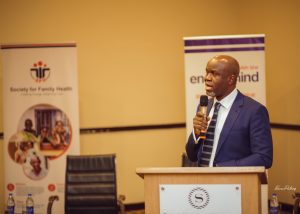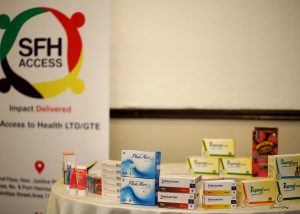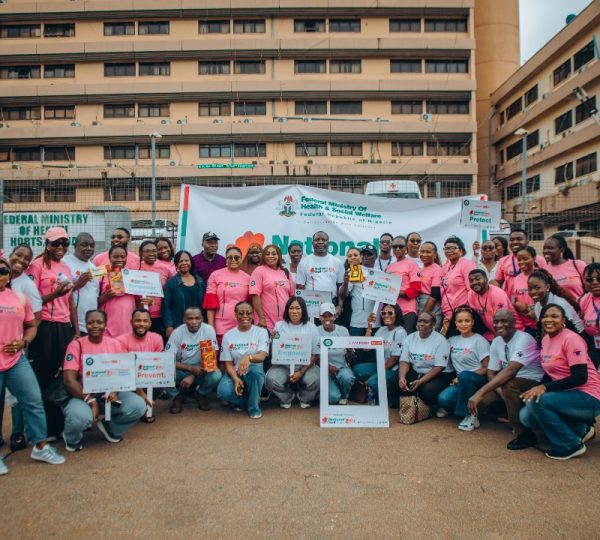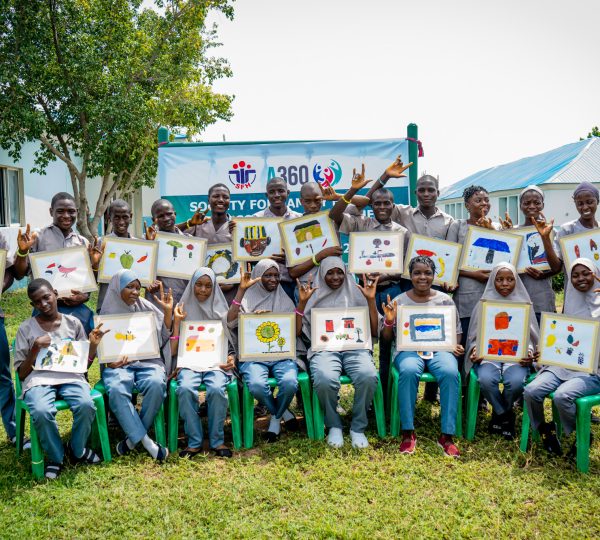How to achieve better health outcomes in Nigeria, by SFH
Determined to ensure better health outcomes in Nigeria, the Society for Family Health (SFH) has announced the end of the operation of its strategic plan. Facilitating People-Centred Healthcare (FPCH), and the development of a new strategy for the next generation, it said, will be the basis of the operations of the organisation going forward.
Managing Director, SFH, Dr. Omokhudu Idogho, at the Society’s International Leadership Retreat, which heralded the new work strategy and 40th anniversary celebration, told journalists: “This next strategy calls us to leverage our 40 years of experience to rewrite the constructs of the Africa health system, with a clear focus on stronger partnership, forward thinking science and an untiring commitment to transform health outcomes for all.”

President of the board of SFH, Prof. Ekanem Ikpi Braide, said: “This anniversary is a unique opportunity to tell our stories and to celebrate the people we serve – our donors, and our governments.
“This retreat, therefore, is an opportunity for us to pause, reflect, unlearn, learn and re-ignite our collective purpose to finish the job we have started, working with our partners…”
The SFH’s international retreat in Lagos, which held, last week, was addressed by the Chief Executive Officer (CEO), Nigeria Primary Health Care Development Agency, Dr. Faisal Shuaib; Lagos and Ekiti states health commissioners, Prof. Akin Abayomi and Dr. Oyebanji Filani, and other eminent technocrats and government officials.
On how to achieve better health outcomes in Nigeria, Idogho told The Guardian, on the sidelines of the retreat: “Broadly, there are four broad weaknesses to how the nation is approaching the achievement of better outcomes for health of Nigerians. First, we have taken a narrow definition on how we approach health. What that means is that we see health from healthcare perspective. However, for countries that have made gains, they approach health from what is called the one health approach. What that means is that they recognise that a good potable water supply system is good for drinking as well as ancillary facility; a sanitation system that is safe; a public infrastructure system that works; an environment that is devoid of fumes and loud noises. All in many ways contribute to better health outcomes that we are looking for. Like education, the better a citizen is educated, the better health outcome because they are likely to adopt what we call health-seeking behaviour.
“Personally, for me, if you look at these different elements, there are ways you measure which of them will contribute the biggest impact. Water supply, sanitation, hygiene are critical elements.
“We are also skewed towards more curative, we want to treat or manage diseases rather than focusing more on preventing diseases. That is a weakness in the system because it costs more to treat diseases compared to preventing diseases.
“For us at SFH, we are quite pleased because just reflecting on our 40th anniversary, our focus and strength have been on how to deepen the preventive elements of the healthcare system, while at the same time working on wider determinants of health- water supply and sanitation and hygiene promotion- in a way that we can contribute our quota to better health outcome for Nigerians.
“It is a partnership between government as a regulator, facilitator and enabler. As a citizen I have responsibility for health-seeking behaviour, that is the things I do that makes me stay healthy.
“On the other hand, communities need to support in the ways norms are defined so that I feel safe to go and access that healthcare. Government must enable an environment that provides that service. At SFH, we work on these different dimensions.”
Until now, the SFH prides itself for contributing substantially to Nigeria’s health sector achievements in the last 40 years, including the reduction of maternal mortality from 1,000 per 100,000 live births in 1985 to 512/100,000 live births in 2021, and infant mortality rate coming down from 132 per 1,000 in 1985, to 54 per 1,000 live births in 2022.
It has also been a leader in family planning, Human Immuno-deficiency Virus/Acquired Immune Deficiency Syndrome (HIV/AIDS), malaria, tuberculosis, nutrition, hypertension, diabetes, and COVID-19 among others.
Leaders from SFH branches in the four Anglophone West African nations—Sierra Leone, Liberia, Ghana, and Nigeria—attended the two-day retreat.

Idogho said SFH has been a training ground for Nigeria’s health sector; many former staffs have become country leads and top technocrats in many International Non Governmental Organisations (INGOs) and other development sector organisations.

He said: “SFH has made impact in many areas, but its most notable achievements are in reproductive health and water safety. SFH has been responsible for water treatment commodities, which have evolved over the years from liquid Water Guard to powder Water Guard, and to the one that is about to enter the Nigerian market—Water Guard Tank.”
On why the new Water Guard Tank Disinfectant and when is it hitting the market, the SFH MD, said: “Bad water is a major cause of illness whether diarrhoea, cholera or typhoid. There is a science to how water is managed. For over 500 years, there is a chemical called chlorine that is used to make water safe. So, we created a liquid formulation. But because our weather is hot, chlorine denatures quicker in this part of the world than others. After two years, you are not getting the value and that is why we created the powder formulation, which can last almost three years. But we still noticed that when we ran a random sampling, the upper middle class and elites that treat their water still have water borne diseases.
So, we asked what is actually the problem. We observed that the middle class and elites still have to use tap water or borehole to wash fruits, vegetables and sometimes have to use it to brush their teeth.
“So, we decided to go back to the source. We thought of finding a product that can disinfect the water right from the source. So, that was the basis of the water guard tank floater. It treats water right from the source. One single pack can treat 80,000 litres of water. It comes with a kit where users can test the water they drink. We are hoping that sometime this February, we should be able to get it into the market.”
Reacting to whether SFH’s programmes were affected by the cut in overseas health budget by the United Kingdom (UK) and United States (US), Idogho said: “I think the answer is yes. Overall, overseas assistance have dropped globally. In addition to the dwindling, re prioritisations are happening. It is important we recognise that aids, by its design, is a percentage of the wealth of those countries. So, COVID-19 affected them, also, and they have less to give out. At SFH, we are trying to be forward thinking. We have tried to adapt and give more value for every single Cent; we have tried to build efficiencies. I see sustainability from two perspectives- programmatic sustainability and impact sustainability.
“Programmatic sustainability presumes we must continue to do the same thing, but impact sustainability is you can fix the problem, and if the problem is fixed, what do you do to ensure the problem that is fixed is fixed.
We have started what we call individual giving strategy. So, we are asking Nigerians to make a small pitch, like a N5,000 donation will keep a girl in school because it provides her sanitary requirements. If you give us N15, 000 it will help a woman in a clinic get delivery.”
On his expectations from the presidential and gubernatorial candidates on healthcare development, Idogho said: “I think health is a fundamental right of every citizen. I think it is a core political infrastructure. It is unfortunate that in this part of the world, we are more interested in infrastructure. In other climes, you can’t win an election if you dodge anything to do with health because health is wealth. My expectation is that in last ten years, we have made some marginal gains. I think the conversation our politician should be having is how to accelerate those marginal gains.
“We should embrace more disruptive approach to improve healthcare. For example, we know that different health intervention across what I called the one-health continuum delivered differently in terms of impact. My dream is that whoever comes in has the courage to make hard decisions on interventions that may not be politically popular, at the moment, but can give the best value to citizens. Also, resource and leadership are critical to the health sector, because if you look at conversations in the health space, we don’t have real value for money spent. It requires real leadership to recognise that health is beyond building facilities, but thinking through the system in a more comprehensive way from preventive to curative.”
On whether he is excited about the presidential candidates manifestoes on health, the SFH boss said: “When political discourse happens in other climes, you are able to narrow down what it means, like how many millions are going to get more health care.
“I think some of the conversations play on what I call financing the healthcare; what is the role of insurance, what is the role of tax financed care? We need more money through the tax system, but there is also the political will in terms of how to organise healthcare.
“The 15 per cent of yearly national budget for health recommended by Abuja Declaration is good, but in some states, they’ve not even done up to 10 percent. The idea of health being cheap is a difficult one and investment has to be made.”
How far with SFH programmes on reproductive health, HIV control and contraceptives? Idogho said: “At SFH, we look at what we can do to reduce a person’s chance of exposing to a disease. We also ensure people exposed to disease don’t die. We also do health security where those exposed to disease don’t infect others.
“Our work in family planning is a whole spectrum where we ensure women don’t die unnecessarily. It’s centered around the patient’s choice on which methods to use. We try to tell the clients on different options open to them. We work on supporting them to ensure the service they want is available. The same principle is applied to HIV. Again we ensure citizens are not exposed to HIV. From risk assessment to protecting yourself, to ensuring you have the commodities- condoms and lubricants. We also test, so that for those who are infected, we can put them on treatment and that reduces their ability to transmit the virus. For those that are negative, we encourage them to stay negative.
“Malaria is another area we work on. We are proud of our partnership with the Nigerian government. Over the last decades, we have given over 52 million long-lasting insecticidal nets to ensure people don’t get bitten by mosquitoes. We also do promotions on how to use the nets. And those that gets exposed, we also use tablets to ensure they don’t die.”
SFH Nigeria focuses on six major health intervention areas; each deliberately selected as identified fields, which significantly affect family health in Nigeria.
They are: clean and safe water systems; HIV and AIDS prevention and treatment; malaria prevention and treatment; maternal and child healthcare; health and social systems strengthening; and family planning and reproductive health.
SFH’s projects are specialised activities implemented in partnership with communities, the government, donors, and the private sector to deliver better health outcomes for all Nigerians. The projects are executed, supervised, and monitored via our 16 field offices around Nigeria and the Federal Capital Territory (FCT).
SFH’s intervention areas include; Treating and positively changing behaviour towards malaria prevention and treatment with the use of rapid diagnostic test or microscopy, HIV/TB treatment and prevention (including prevention of mother-to-child transmission), adolescent and young people programming, reproductive health and family planning (RH/FP), health policy and financing, pharmaceutical systems strengthening, research and management information systems, cervical cancer screening and prevention, and safe water systems.
SFH is a pan- African non-governmental organisation founded in 1983 by Honourable Justice Ifeyinwa Nzeako, Prof. Olikoye Ransome-Kuti, Mallam Dahiru Wali (a pharmacist) and Mr. Phil Harvey. SFH began as a Population Services International (PSI) affiliate with one HIV grant and reproductive health products for distribution in Nigeria.
In 1985, SFH was incorporated as a Nigerian non-governmental organisation and in 1994 released the “Who Get This Rain Coat” Gold Circle Condom/Family Planning campaign on national television. In the late 1980s, it went into partnerships with pharmaceutical companies to distribute Gold Circle condoms in Lagos, Oyo, and Ogun States, in South Western Nigeria. It soon scaled up its operations, expanding nationwide, and commencing the marketing of oral contraceptives, in partnership with United States Agency for International Development (USAID). A partnership with the then UK’s Department for International Development (DFID) (now the Foreign, Commonwealth and Development Office) followed which also focused on the marketing of condoms, oral and injectable contraceptives, and a water-based lubricant.
By 1997, SFH was distributing seventeen million condoms yearly, and by 2009, 200 million condoms all over Nigeria at a subsidised price. In 2003, SFH launched its malaria programme, in partnership with USAID. The focus was on the treatment and prevention of malaria – one of the biggest causes of infant and child mortality in Nigeria. The malaria programme has grown significantly, with funding and support from The Global Fund to Fight AIDS, Tuberculosis and Malaria. Currently, the focus is on the use of Artemisinin-based Combination Therapies (ACT) and conducting Rapid Diagnostic Test for malaria before treatment as well as encouraging proper use of Long-Lasting Insecticidal Nets.
In 2005, SFH became the first Nigerian organisation to receive direct funding from the USAID to implement programmes in reproductive health. SFH is operating in four West African Countries – Liberia, Ghana, Sierra Leone, and Nigeria. They have 20 regional offices and 19 active projects present across all 36 states in Nigeria including the Federal Capital Territory where the organisation is headquartered.
The Society for Family Health ensures healthy pregnancies, safe deliveries, child spacing, and emergency interventions for women at risk. The organisation receives its funding support from a number of national and international donors. Among these are: The World Bank, Bill & Melinda Gates Foundation, The Children’s Investment Fund Foundation, MSD for Mothers, the United States International Development Agency, Stop TB partnership, the Foreign, Commonwealth and Development Office, Oxfam Novib, United Nations Population Fund, and The Global Fund to Fight AIDS, Tuberculosis and Malaria.
Source: Guardian Newspaper




